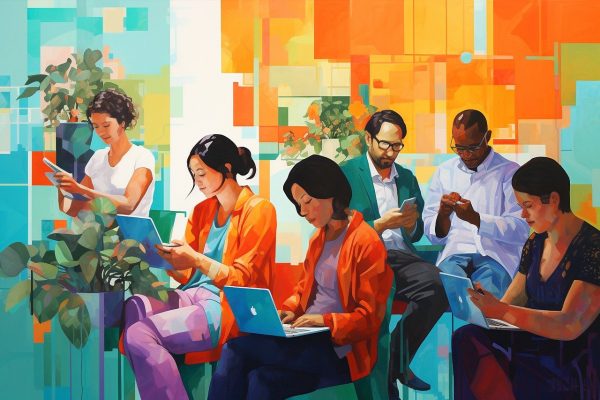
A contingent from U-M took part in the first-ever US-RSE (United States Research Software Engineer Association) annual conference. It was held at the University of Illinois Chicago, October 16–18, 2023.
Abbey Roelofs and Michael Egan (College of Literature, Science, and the Arts), Srikanth Lavu (Marsal Family School of Education), and Andy Boughton (School of Public Health) attended the conference in person, and Mark Ciechanowski (Michigan Medicine), joined remotely for live-streamed sessions.
According to US-RSE, “We like an inclusive definition of RSEs to encompass those who regularly use expertise in programming to advance research. This includes researchers who spend a significant amount of time programming, full-time software engineers writing code to solve research problems, and those somewhere in-between. We aspire to apply the skills and practices of software development to research to create more robust, manageable, and sustainable research software” (source).
Abbey remarked, “Given this definition and the broad range of research activities supported by technology at U-M, we have lots of RSEs right here at U-M—many more than were able to attend this conference!”
RSEs play a critical role in research
The role of research software engineers (who may go by a wide range of working job titles) is increasingly being recognized as an important part of the research community.
The US-RSE Association is a community-driven effort that aims to “improve the development of research software, and incentivize useful sharing, curation, and ongoing maintenance of research software artifacts and related knowledge” by pursuing “four overarching goals: Community, Advocacy, Resources, and Diversity, Equity, and Inclusion (DEI)” (source).
This conference—the first of its kind in the U.S.—was an opportunity for RSEs to meet others in the same role from universities and national research labs around the country and discuss common issues, share experiences and solutions, and work together to advance best practices in the field.
For the five who attended from U-M (four in person and one remotely), it was a chance to meet and build connections with others doing similar work on different parts of campus. With the exception of Abbey and Michael, who work together, none of the developers had met before this conference. But they found that they have experienced many of the same challenges, which differ from those faced by software engineers supporting administrative, instructional, or commercial applications.
The group was active at the conference, including:
- Heard keynotes about the history, growth, and future of the role of Research Software Engineer
- Attended talks and discussions on topics including machine learning and artificial intelligence in research software, DevOps, and cyberinfrastructure, culture and community, and software engineering best practices for research
- Participated in birds of a feather sessions on topics including code reviews for research software, scientific open-source python software, and Jupyter notebooks as a possible future for scientific publication
In addition, Srikanth presented a talk titled, “Anotemos: A Media Annotation Software for Efficient Research Analysis” at one of the sessions on research and development tooling. View the presentation slides from the conference.
Srikanth is a web applications developer at GRIP Lab in the Marsal Family School of Education. GRIP is an education research lab and their main area of research is teaching mathematics and professional preparation of math teachers. Srikanth supports this research by developing software applications that GRIP researchers and their affiliates use. Srikanth and the GRIP team believe that there is much more potential in their annotation software for use in other research and training areas. With this presentation, they hoped to make some connections and possibly initiate collaboration with other researchers.
The growing role of RSEs
“Research software engineer” as a recognized role is a relatively new concept. Anecdotal evidence suggests that RSEs at universities often work independently, with a single person or maybe a team of two or three doing all the software and development support for a research lab or project.
If this sounds like work you are doing, consider joining a community of others doing similar work to network, collaborate, and problem solve. The US-RSE offers free membership, an active Slack workspace, and monthly virtual community calls.
Editor’s note:
Srikanth Lavu, web applications developer, Marsal Family School of Education, contributed to this article.

This is a great example of how our MichiganIT community can connect and find each other in order to improve our ability to support the University’s missions. It also highlights how we can develop and advance our own careers by reaching out and finding our colleagues here at Michigan and more broadly. Thanks for the article.